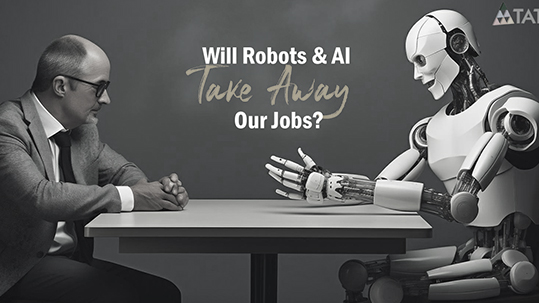“The more we reduce ourselves to machines in the lower things, the more force we shall set free to use in the higher.” ~ Anna Brackett
Being a part of the executive search industry, I am often asked if robots and AI will take away our jobs. Deeper engagement with the questioners uncovered a common misconception that the terms robots or robotics and AI are being interchangeably used. Businesses and governments do use robotics-based applications that can be described as a convergence of AI and robots, the two have apparent differences. AI essentially revolves around enabling machines to make complex decisions autonomously, while AI input helps robots perform tasks efficiently. Not all robots are intelligent; the intelligent ones are, however, AI-enabled!
Simple yes-no answers won’t do
Back to the question, the future’s purpose is not prediction. The purpose is to be prepared because the future is not tomorrow – it’s already here. It occurs quicker for some than for others. If you go to California, you can book a self-driving car and enjoy the ride. If you have sufficient money, you can install a Brain-Machine interface (BMI) and establish a communication link directly to the internet.
As an observer of business and tech evolution, I can confidently declare that the tech revolution is far from ending. All revolutions of this nature bring about sweeping changes in their wake. So will this one. The world must prepare for the future. And though humans will rarely be replaced entirely by AI or robots, humans already using AI will replace those who don’t.
Automation – loss and gain
We will lose jobs that automation can do, but we will also have new jobs based on these changes. When the drudgery of repetitive or dangerous and difficult tasks is taken over by machines, humans will be free to do more challenging work, like interfacing with customers, developing better products, and managing those robots efficiently.
A great example is how spreadsheets and bookkeeping software dramatically changed how accountants work. Far from putting accountants out of work, the field has grown significantly. Does this mean that anyone can do their own financial statements and taxes? Of course not – accounting professionals are still needed. In fact, with the introduction of MS Excel in 1989, accounting became one of the fastest-growing industries globally.
It’s estimated that about 1.28 million accountants, bookkeepers, and auditors now. That number is expected to keep growing through 2029 by about 4% annually.
Another example is ATMs. Did these machines do away with bank tellers? On the contrary, in 1970, there were about 250,000 bank tellers when the first ATMs had just been introduced. By 2019, there were about 400,000 ATMs installed in the US—and the number of bank tellers had doubled.
The evolution of work
What exactly happened? Both accountants and tellers started doing more involved work, viz. spending less time bean counting and more time building client relationships and walking those clients through more complicated problems, like helping customers address financial issues. They talk to customers about loans, investments and financial management. Both of these jobs are higher-skilled than the work accountants and tellers were doing before. The washing machine reduced the monotony of hand-scrubbing clothes. Factory jobs were created upstream to manufacture washing machines, while downstream laundromats became a new convenience, creating jobs as well.
How willing are we?
Our task therefore is to prepare people for higher-skilled as well as lower-skilled jobs. The point is how prepared we are to embrace this. Add your comments below…

